11 Minutes
The final panel of this year’s Going Global conference gathered an unusually candid mix of voices from Lithuania’s innovation landscape. It was a moment where the room — already warmed by two earlier discussions — leaned in to hear whether small innovation hubs can truly stand shoulder to shoulder with the giants of Berlin, London, or San Francisco. And perhaps more importantly, what it even means to be “up-and-coming” in a world where geography is increasingly porous.
Moderated by Bojan Stojkovski, a tech journalist who had flown in earlier that day and barely had time to taste Lithuanian food, the session quickly found its rhythm. His outsider’s perspective helped sharpen the conversation. Coming from the Balkans, a region often conflated with the Baltics by those who don’t bother learning the difference, he opened the panel with a challenge: How do smaller regions escape the perpetual label of emerging while still benefiting from the attention that comes with it?
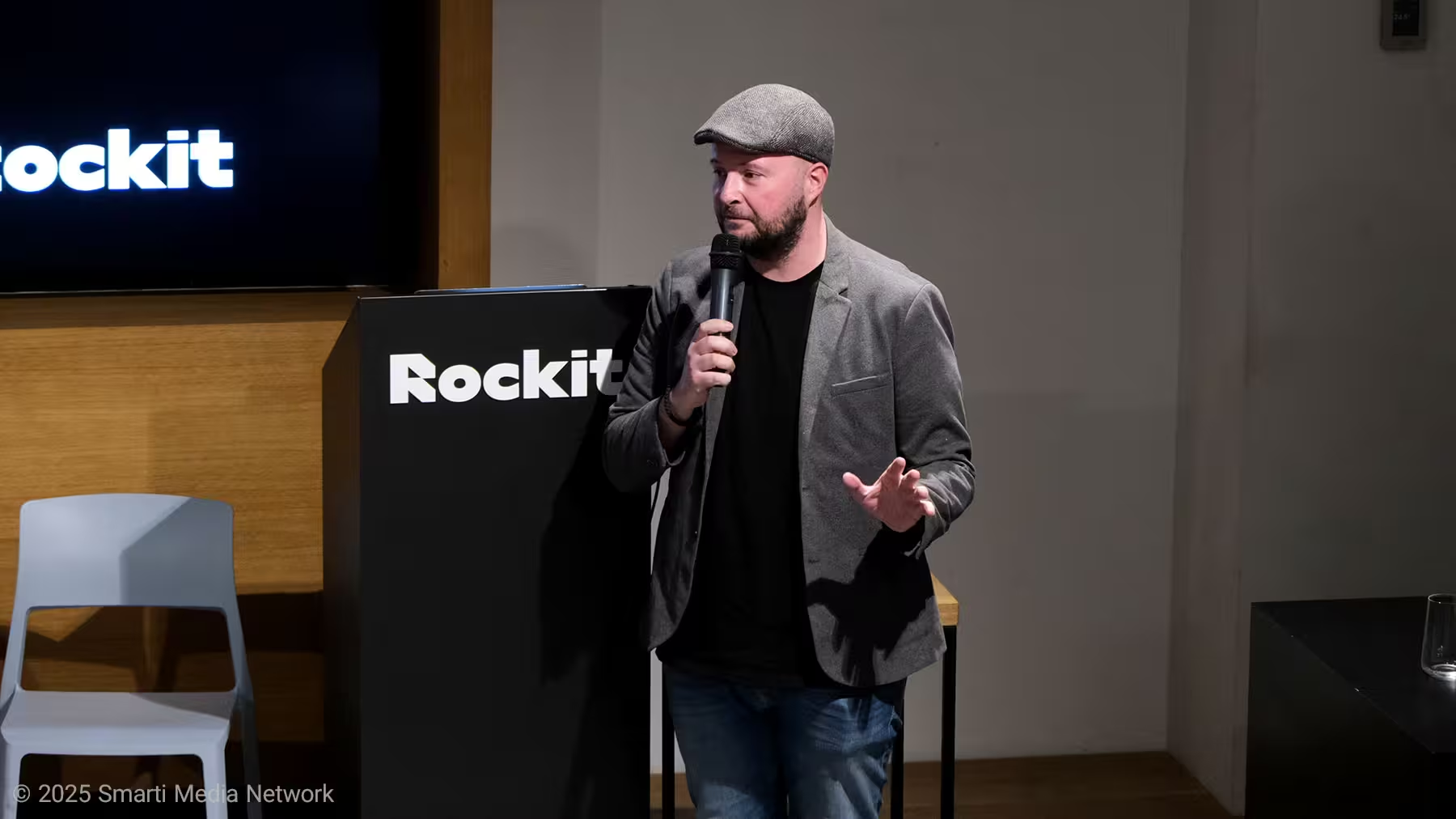
On stage with him were four people who each represented a slice of Lithuania’s tech metamorphosis:
Mangirdas Šapranauskas of Go Vilnius, Lina Žemaitytė-Kirkman of Rockit, Simona Šimulytė of Lithuania BIO, and Gytis Labašauskas from TransferGo. Together, they mapped a picture far more intricate than the typical “small country, big ambitions” narrative.
The “Up-and-Coming” Label: Gone or Still Hanging Around?
Labašauskas wasted no time pushing back on the idea that Lithuania should still be considered emerging. His argument was almost architectural: once a region produces landmark exits, the old scaffolding falls away. Skype from Estonia, NordVPN from Lithuania, the rise of consumer and B2B unicorns across the Baltics — these events shift the center of gravity.
In his words, once founders who have exited begin reinvesting that capital locally, the ecosystem reaches a new phase. Capital becomes stickier. Angel networks expand. Funds start seeing their natural home not in London, but in Vilnius. Success compounds.
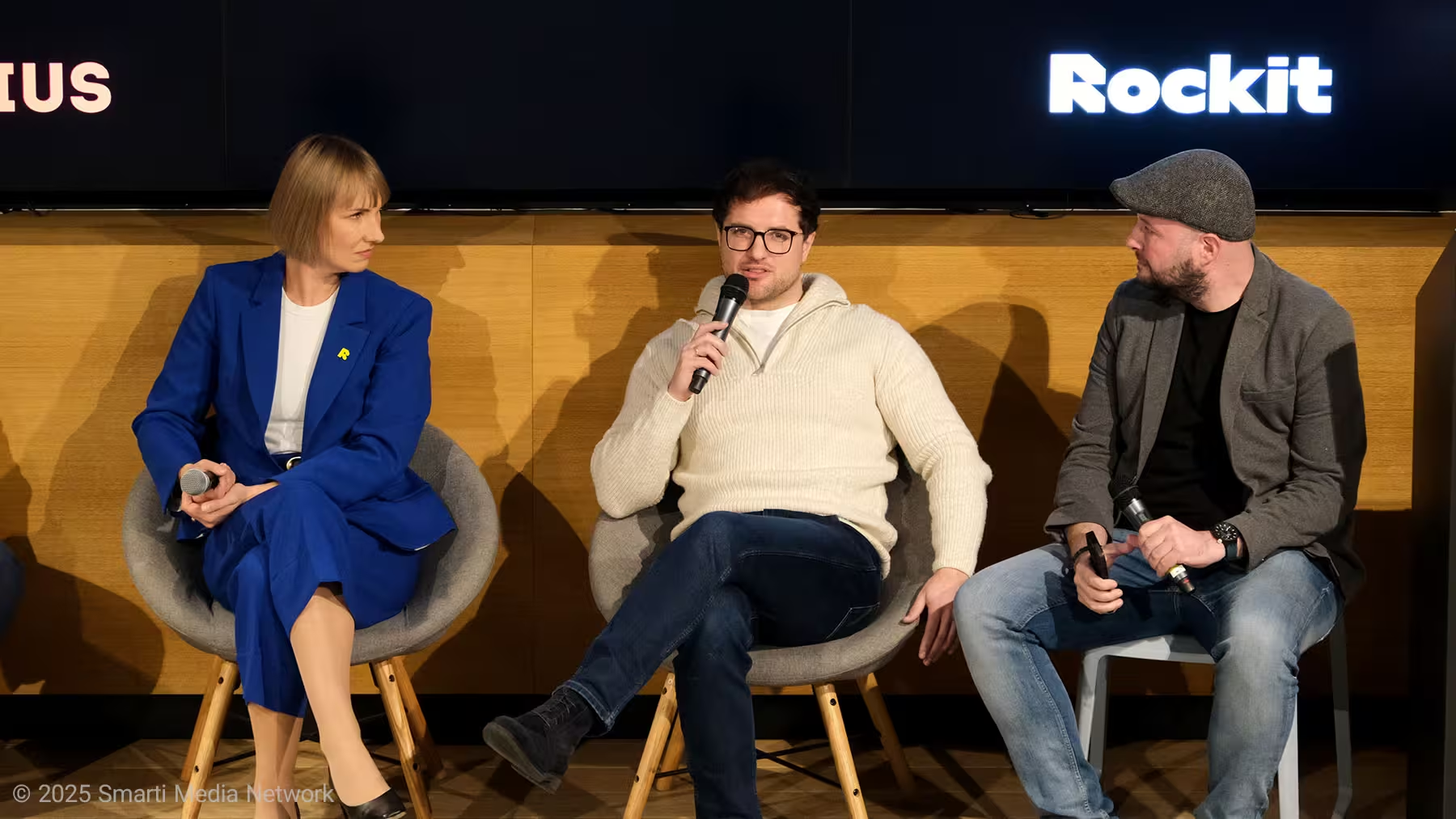
At the same time, Lithuania’s size forces global thinking from day one. There is no illusion that a startup can grow meaningfully in the domestic market. This enforced frugality, this refusal to rely on an abundant home market, becomes a kind of training ground. As he put it, “the second round might not come — sometimes even the first round doesn’t come. So we learned to operate with tight P&Ls and build defensively.”
That idea — that limitations sharpen instincts — surfaced repeatedly.
Agility as Identity
Žemaitytė-Kirkman approached the question from another angle. Instead of debating the label itself, she reframed what “up-and-coming” signals in a world saturated with noise. For her, it is not about being undiscovered. It’s about being agile. A small ecosystem moves faster. It avoids bureaucracy not by design but by necessity.
She emphasized that Lithuania has already positioned itself strategically rather than trying to mimic larger hubs. It chose fintech as a national niche years ago. The decision wasn’t casual; it was coordinated across regulators, financial institutions, and the startup community. That made the country visible long before its neighbors fully realized what had happened.
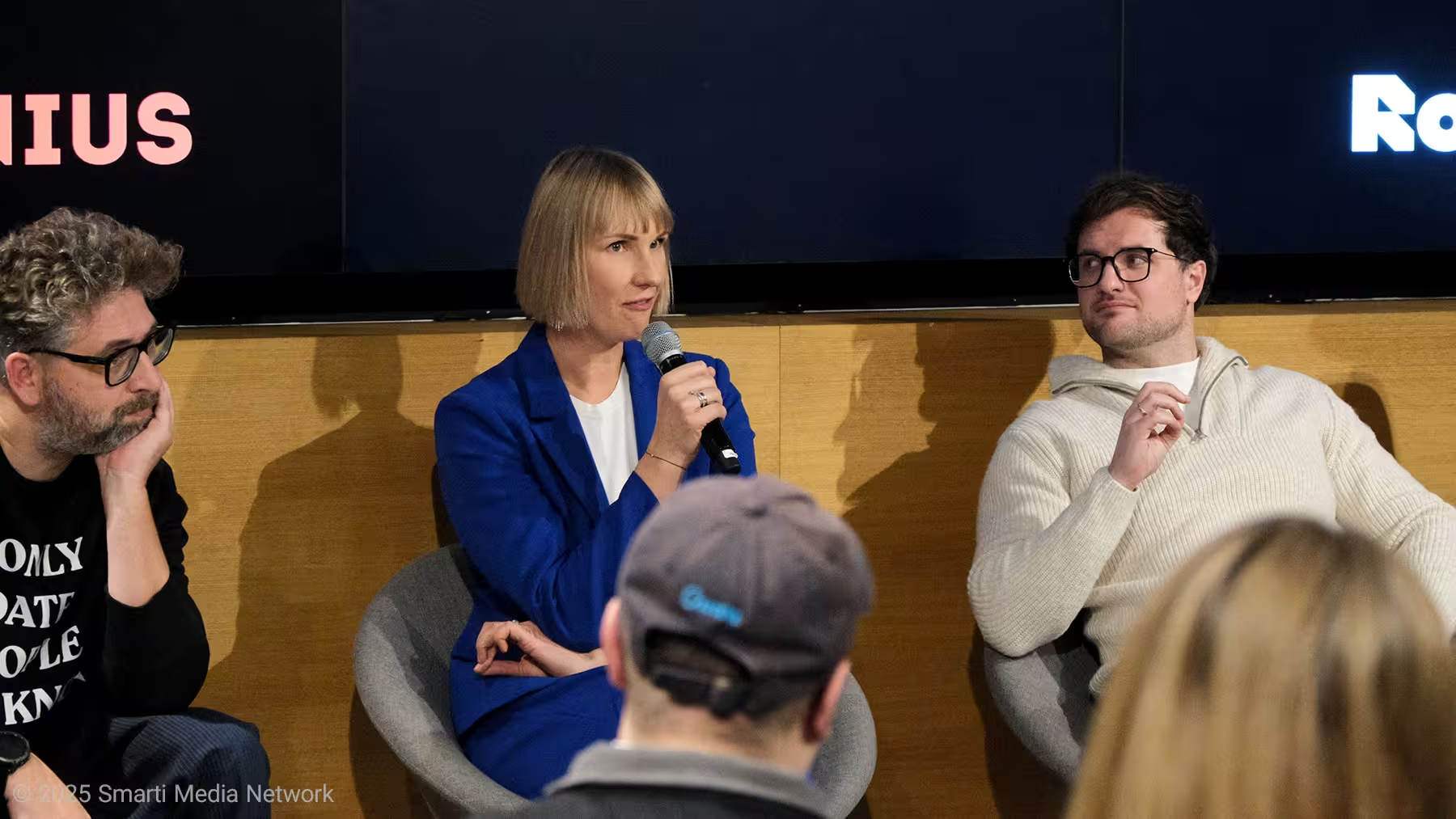
Biotech, lasers, deep tech — these are not new experiments. The foundations go back decades. Expertise didn’t appear overnight. When Lithuania markets itself today, it is selling accumulated competence rather than hype.
And yet, Žemaitytė-Kirkman noted, the challenge for small hubs is not to become everything to everyone. Specialization is not optional; it is survival.
Vilnius as a Startup
Šapranauskas introduced a metaphor that stuck with the audience: Vilnius itself behaves like a startup. Compared to London or Berlin, Vilnius moves quickly because it can. Decision cycles are short. City officials, investors, founders, and innovators share overlapping networks. Mistakes are absorbed rapidly. Cost of iteration is low.
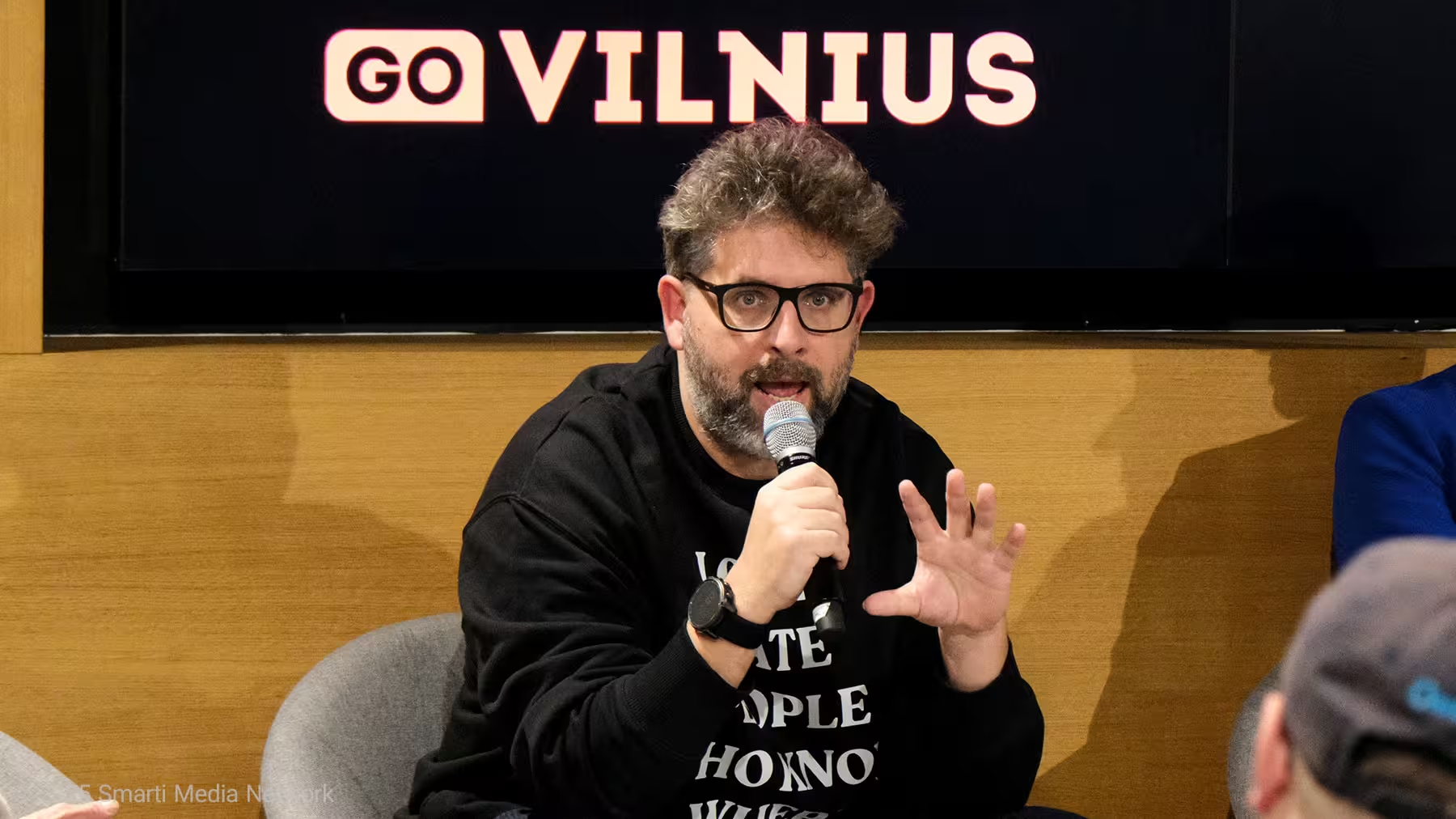
When foreign investors visit, the first reaction he hears is admiration for speed — not just digital speed, but bureaucratic speed. A licensing process that may take months elsewhere might take weeks in Lithuania. A pilot project that feels impossible in a megacity becomes feasible in Vilnius simply because the city is compact enough to treat itself as a laboratory.
This insight blossomed into a broader theme: small hubs can outmaneuver larger ones not through brute force but through the velocity of coordinated movement.
Trust as Infrastructure
Simona Šimulytė added a layer rarely mentioned in tech-heavy conversations: trust. In her view, smaller ecosystems have a structural advantage that cannot be easily copied. Trust forms faster. It scales differently. People know one another not just professionally but socially. Researchers meet founders in informal settings. Venture capitalists meet regulators without ceremonial distance.
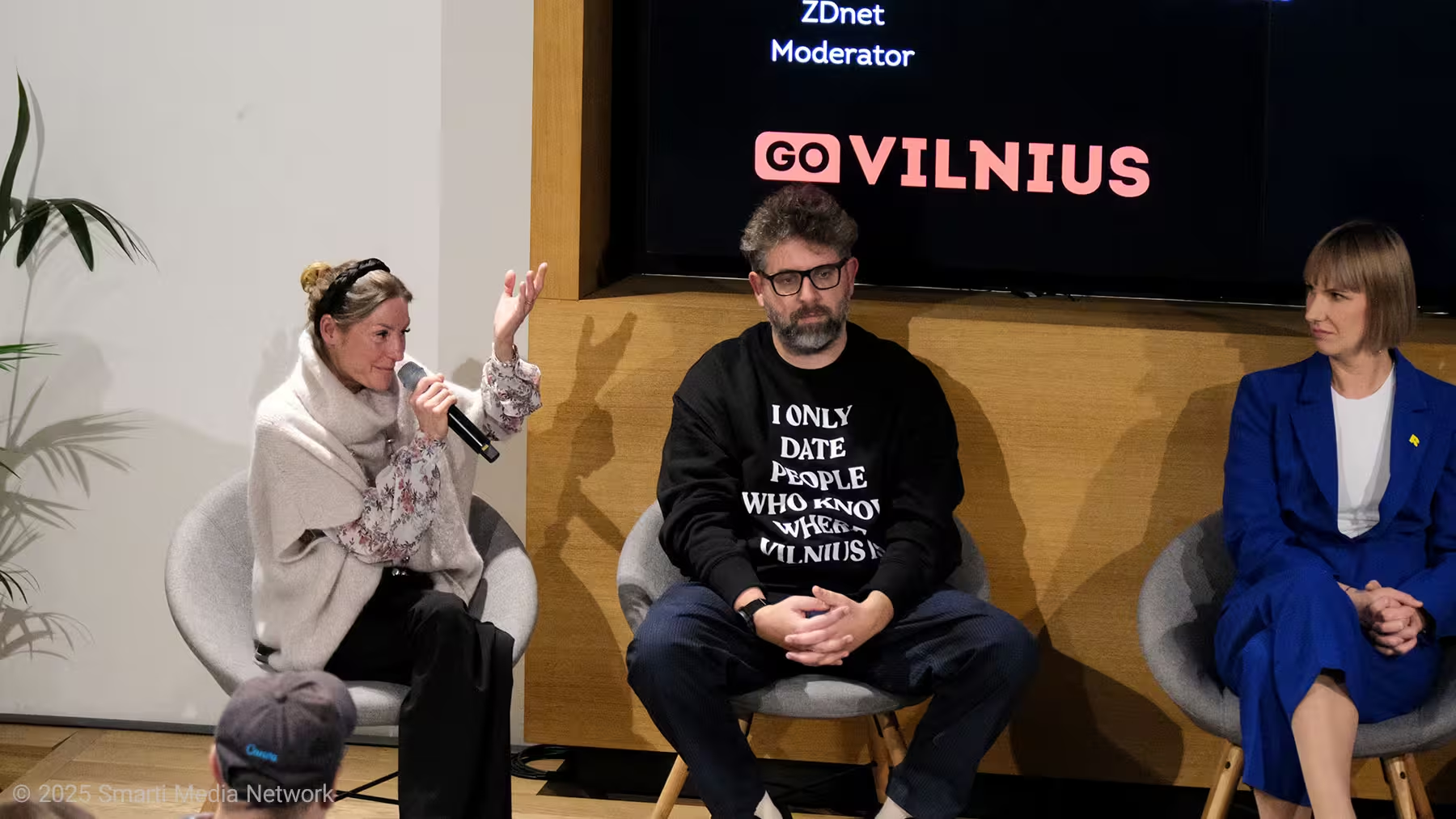
Lithuania’s bioscience sector illustrates this dynamic well. Unlike fintech, where rapid scaling is possible, biotech requires long timelines, extensive certification, and rigorous regulatory pathways. Yet Lithuania has carved out a position not by being cheap — a strategy many small economies attempt — but by offering quality and reliability. Value, not discount pricing.
“Sell the value, not the price,” she insisted. And because Lithuania is small enough to treat itself as a test environment, biotech teams can prototype, adjust, and certify faster than in large countries weighed down by complex infrastructure. The metaphor she used — Lithuania as a laboratory — resonated with the entire panel.
Measuring Success Beyond Unicorns
The moderator shifted the conversation toward metrics. What defines success for a small hub? Exits? Unicorns? Number of startups? Šapranauskas responded from the perspective of a city attempting to brand itself worldwide. Vilnius, he said, uses four internal pillars to assess its trajectory:
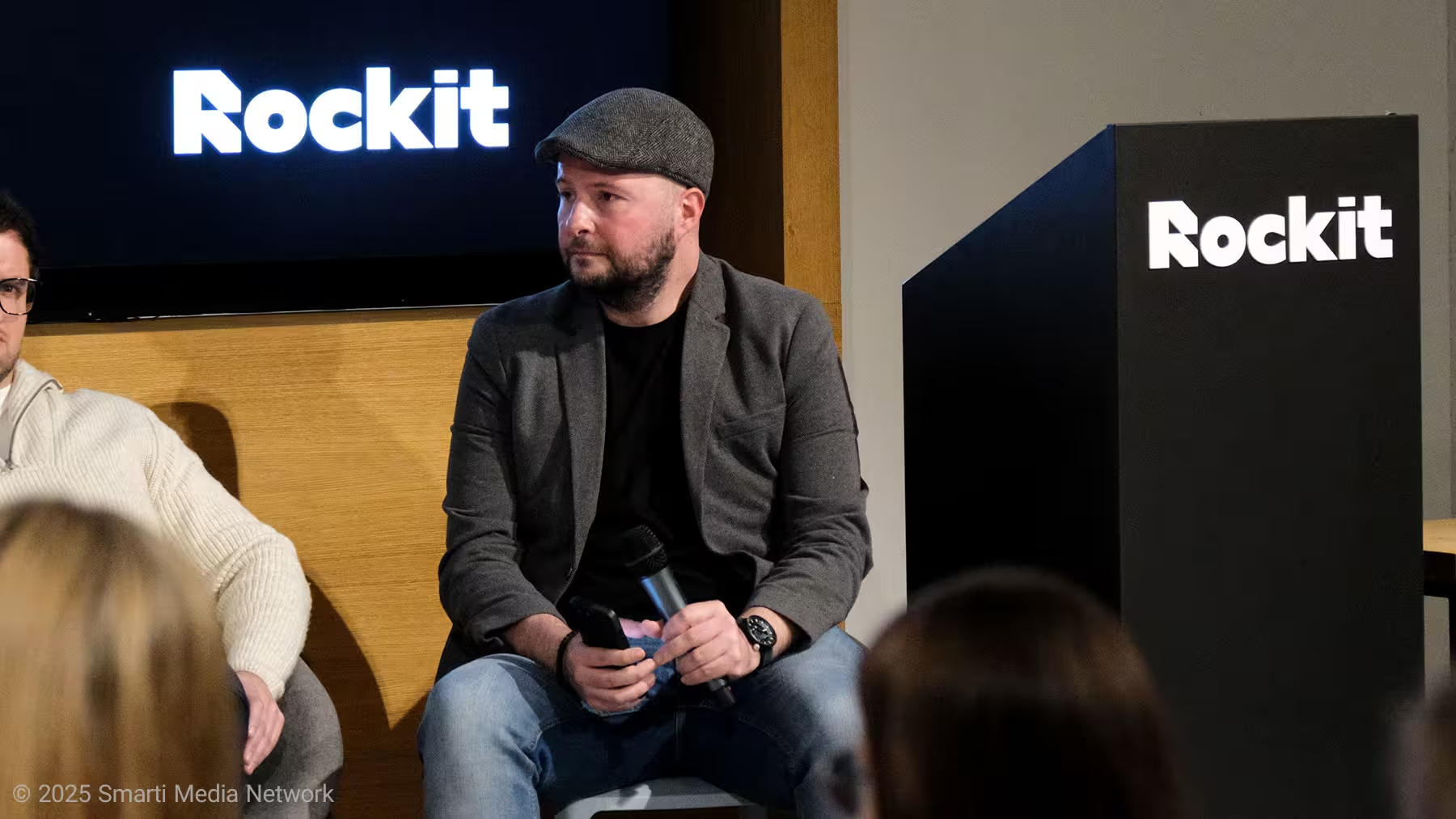
Investment flowing into the city.
R&D output visible and measurable.
Quality of life for residents.
Attractiveness as a place to invest.
He argued that narrative and measurement cannot be separated. To position a city globally, an ecosystem must define what success feels like for the people living and investing there. It is not purely analytical. It is experiential.
Competing with Giants
When the panel was asked whether Lithuania should compete with global hubs on their terms, the response was nearly unanimous: chasing London or Berlin is a losing game.
Žemaitytė-Kirkman noted that Lithuania excels when it builds around niches already proven to be strategic. Berlin can be good at everything; Lithuania must be good at specific things. In that sense, the ecosystem resembles a precision tool rather than a general-purpose machine.
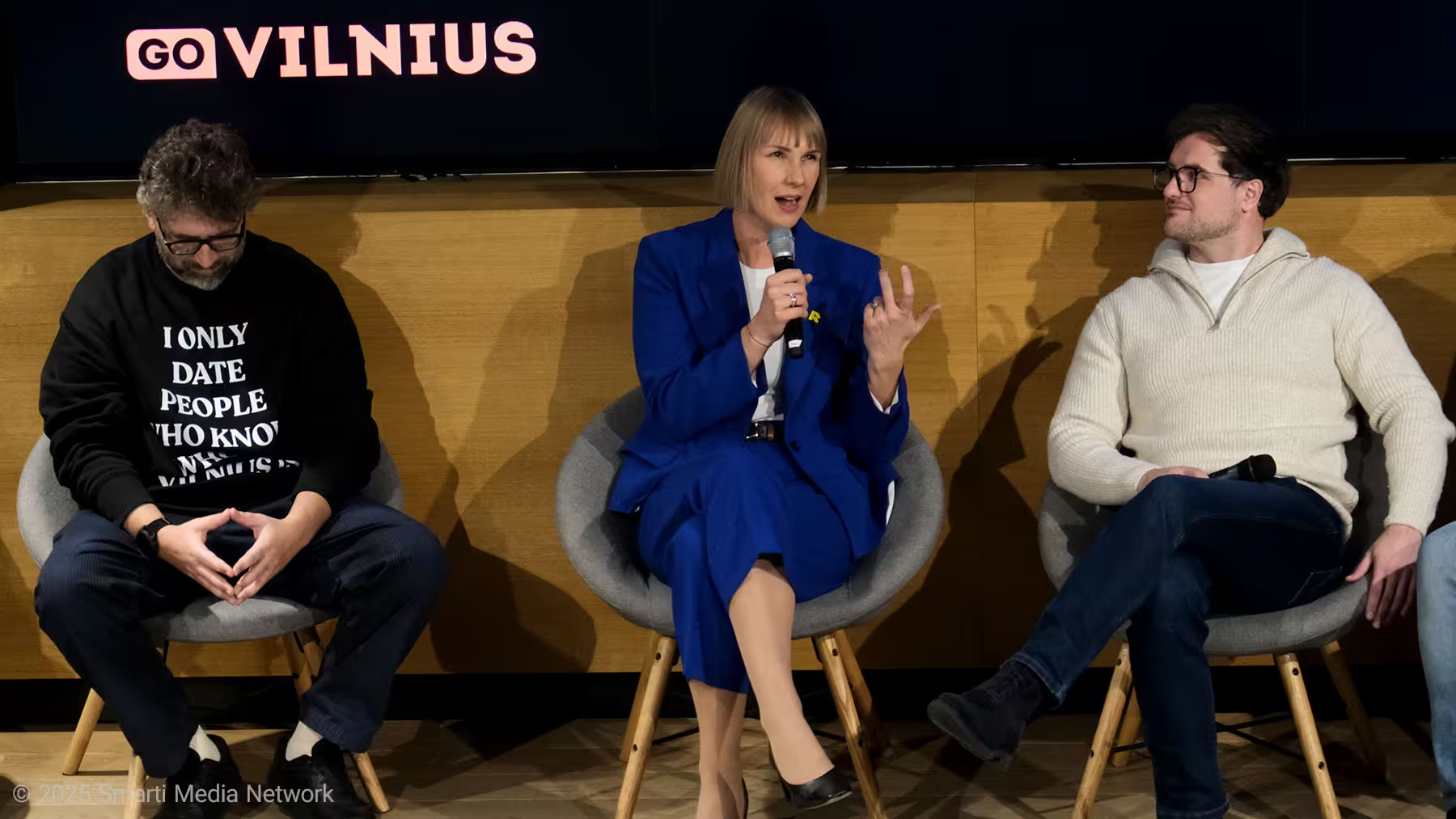
Šimulytė expanded the argument by noting that biotech cannot be rushed. If Lithuania attempted to scale like Berlin, it would lose the trust-driven, methodical pace necessary for deep-tech credibility. Competing on speed alone would be a mistake.
Meanwhile, Labašauskas highlighted that although capital access differs dramatically between smaller and larger markets, the global distribution of talent has fundamentally changed. Since COVID-19, geography no longer limits participation in high-level innovation. A Lithuanian engineer can work for a US startup without relocating. A Lithuanian founder can raise international capital without living in London.
This shift undermines the old hierarchy of who gets to be considered “central” and who is “peripheral.”
Myths That Hold Small Ecosystems Back
In the latter part of the discussion, Labašauskas took a more philosophical stance. One myth, he argued, is the notion that where you are matters as much as it used to. Talent today is radically distributed. What differentiates regions is no longer saturation of capital but depth of culture — how ecosystems think about product, resilience, and sustainable growth.
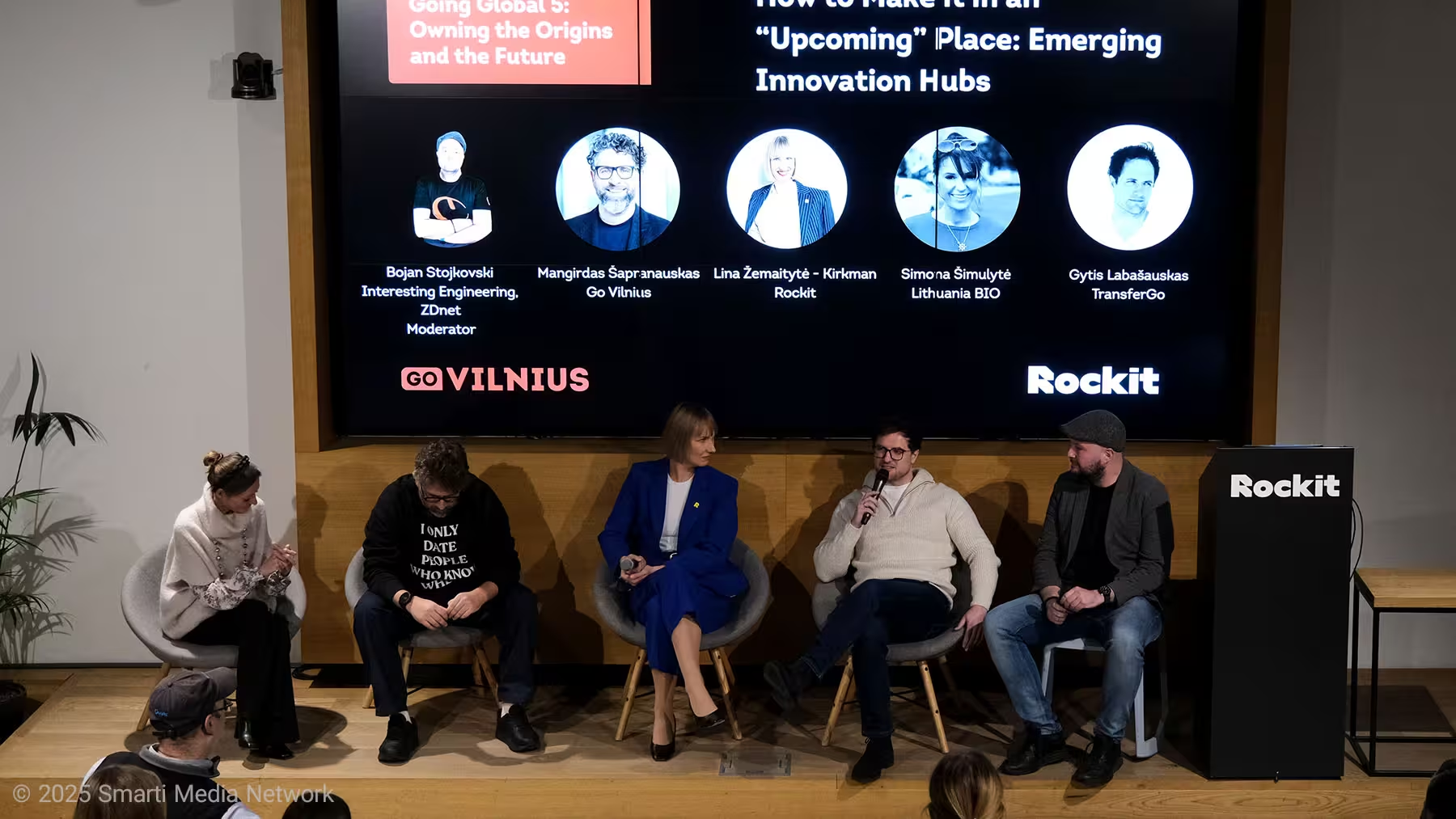
Funding scarcity in Lithuania shaped a generation of founders who learned not to depend on quick capital. They built lean. They built carefully. They built with a realistic understanding of risk. Paradoxically, this created stronger companies.
His argument challenged a comfortable belief: that small ecosystems are inherently disadvantaged. In some cases, the constraints become the very thing that helps them stand out.
Toward a More Confident Baltic Identity
Stojkovski, returning to his initial point about identity, pressed the panel on whether Lithuania and the broader Baltics are still seen as emerging by the outside world. The answers were nuanced. Externally, yes, large parts of the world still perceive the Baltics as small, developing, or even indistinguishable from the Balkans. Internally, however, the ecosystem has already crossed a threshold.
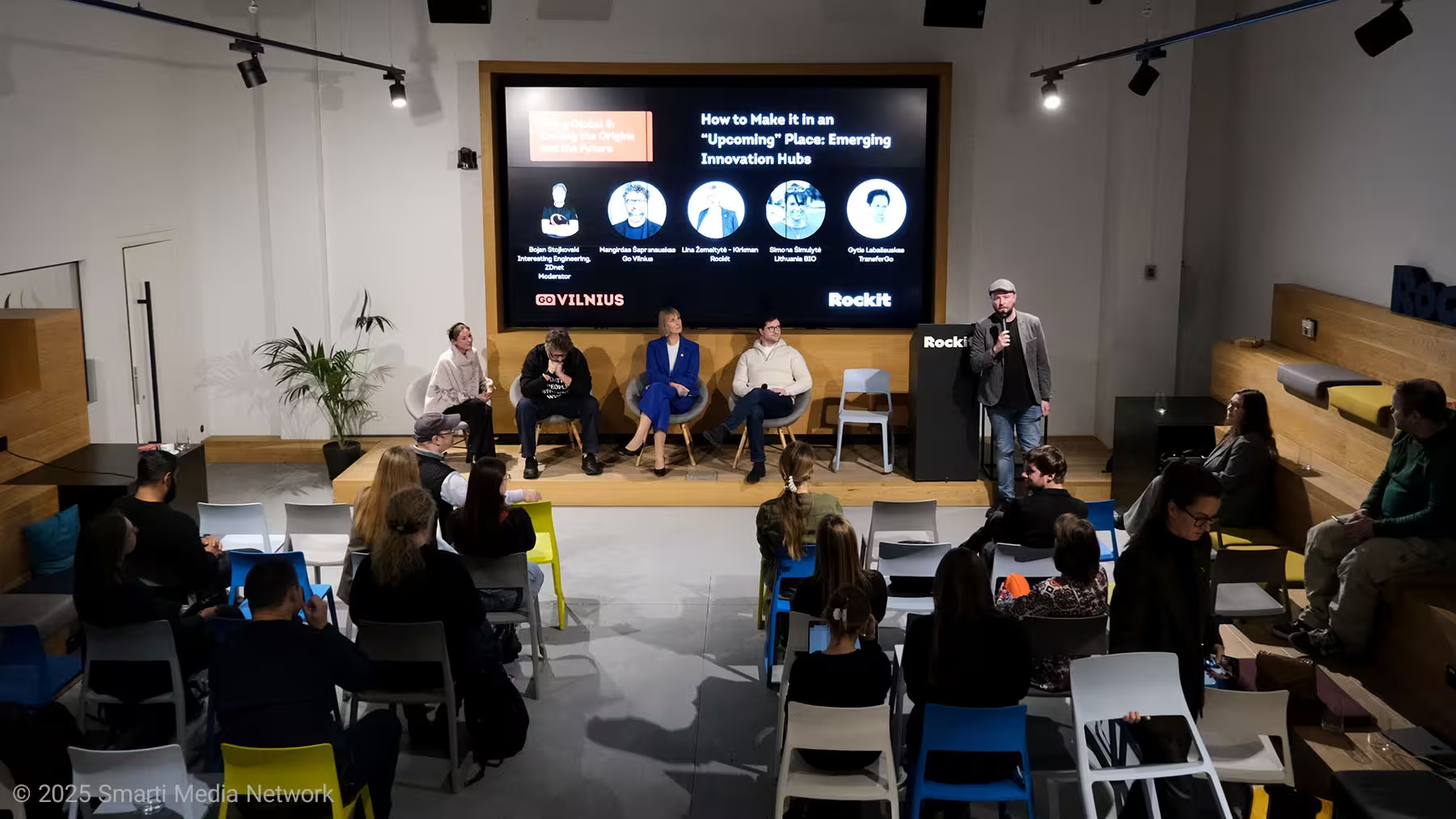
Šapranauskas commented that perception lags reality. Lithuania is already producing mature products, world-class founders, and venture activity at a level no longer appropriate for the “up-and-coming” label. The ecosystem has entered a self-reinforcing cycle.
Yet the panel agreed that smallness itself can be strength. A place does not need to become Berlin to be globally relevant. It must instead become clearly itself — a center for niches where speed, trust, and specialization matter more than population size.
The Anatomy of an Emerging Hub That Has Already Emerged
Across the panel, a number of themes intertwined:
Small ecosystems create trust faster.
Agility beats scale when bureaucracy slows giants down.
Narrative is not cosmetic; it shapes investor perception.
Deep tech and biotech grow slower, but Lithuania is positioned to excel.
Capital scarcity can teach discipline that eventually becomes a superpower.
Global ambitions must start on day one when the home market is tiny.

These ideas, taken together, paint a picture of Lithuania not as an emerging hub but as a place that has already undergone emergence — a place now refining what it means to operate globally without copying anyone else.
A Region Learning Its Own Scale
In the final minutes, Stojkovski returned to something he had said at the start: outsiders still confuse the Baltics with other regions. But by the end of the conversation, it was clear that this confusion doesn’t diminish what Lithuania has built. The real question is whether the country recognizes its own maturity.
Lithuania, in the eyes of the panel, is no longer trying to prove that it belongs on the innovation map. It is shaping the map in its own subtle, nimble way.
As the audience filtered out of the hall, the sense wasn’t that people had heard generic optimism. The mood was more grounded. Lithuania doesn’t win through scale. It wins through precision. It wins through coordination. It wins through choosing where to compete — and where not to.
There is nothing “up-and-coming” about that. It is simply strategic adulthood.
Comments
labcore
Nice framing, yet feels like a PR spin: 'niche' sells nice, but regulatory headwinds in biotech aren't just a speed problem. Still, trusting small networks is big plus. 🤔
Marius
is it really that simple? Sounds great on paper, but investors still chase big names. Talent remote sure, but market access? not convinced yet, need more data
atomwave
Wow, this flipped my script. Small hubs winning by being nimble, trust-heavy and niche. Love the Vilnius as a startup idea. Makes sense, but curious how they scale without losing that culture. If capital floods in, will speed survive? hmm

.webp)
Leave a Comment